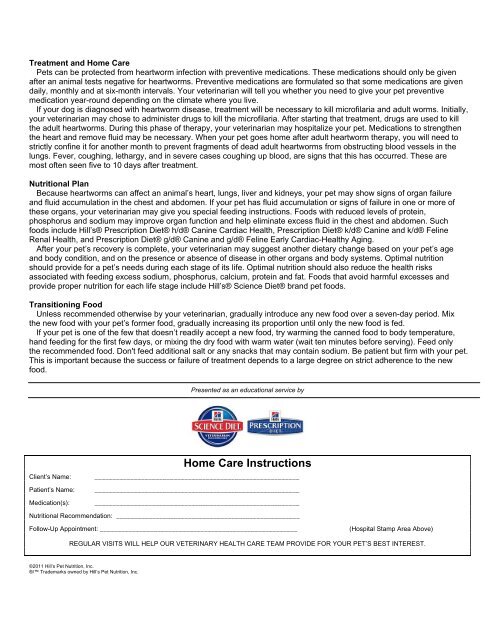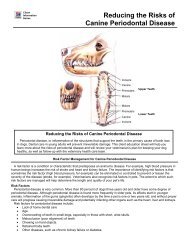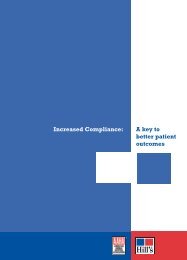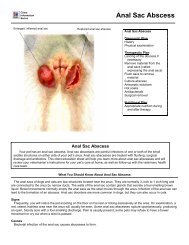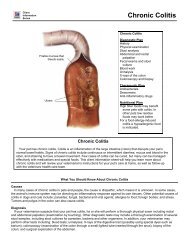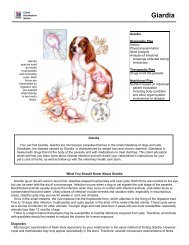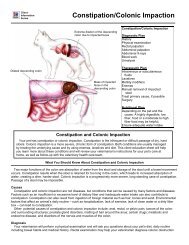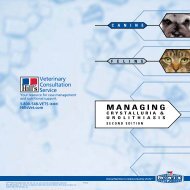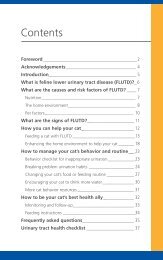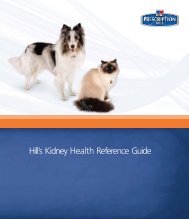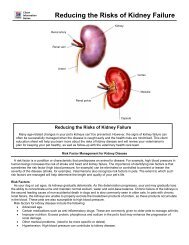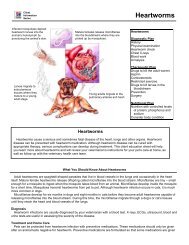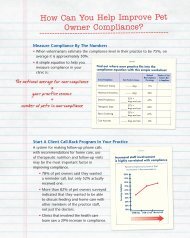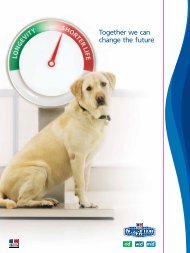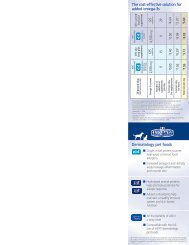Heartworm Disease - HillsVet
Heartworm Disease - HillsVet
Heartworm Disease - HillsVet
Create successful ePaper yourself
Turn your PDF publications into a flip-book with our unique Google optimized e-Paper software.
Treatment and Home Care<br />
Pets can be protected from heartworm infection with preventive medications. These medications should only be given<br />
after an animal tests negative for heartworms. Preventive medications are formulated so that some medications are given<br />
daily, monthly and at six-month intervals. Your veterinarian will tell you whether you need to give your pet preventive<br />
medication year-round depending on the climate where you live.<br />
If your dog is diagnosed with heartworm disease, treatment will be necessary to kill microfilaria and adult worms. Initially,<br />
your veterinarian may chose to administer drugs to kill the microfilaria. After starting that treatment, drugs are used to kill<br />
the adult heartworms. During this phase of therapy, your veterinarian may hospitalize your pet. Medications to strengthen<br />
the heart and remove fluid may be necessary. When your pet goes home after adult heartworm therapy, you will need to<br />
strictly confine it for another month to prevent fragments of dead adult heartworms from obstructing blood vessels in the<br />
lungs. Fever, coughing, lethargy, and in severe cases coughing up blood, are signs that this has occurred. These are<br />
most often seen five to 10 days after treatment.<br />
Nutritional Plan<br />
Because heartworms can affect an animal’s heart, lungs, liver and kidneys, your pet may show signs of organ failure<br />
and fluid accumulation in the chest and abdomen. If your pet has fluid accumulation or signs of failure in one or more of<br />
these organs, your veterinarian may give you special feeding instructions. Foods with reduced levels of protein,<br />
phosphorus and sodium may improve organ function and help eliminate excess fluid in the chest and abdomen. Such<br />
foods include Hill’s® Prescription Diet® h/d® Canine Cardiac Health, Prescription Diet® k/d® Canine and k/d® Feline<br />
Renal Health, and Prescription Diet® g/d® Canine and g/d® Feline Early Cardiac-Healthy Aging.<br />
After your pet’s recovery is complete, your veterinarian may suggest another dietary change based on your pet’s age<br />
and body condition, and on the presence or absence of disease in other organs and body systems. Optimal nutrition<br />
should provide for a pet’s needs during each stage of its life. Optimal nutrition should also reduce the health risks<br />
associated with feeding excess sodium, phosphorus, calcium, protein and fat. Foods that avoid harmful excesses and<br />
provide proper nutrition for each life stage include Hill’s® Science Diet® brand pet foods.<br />
Transitioning Food<br />
Unless recommended otherwise by your veterinarian, gradually introduce any new food over a seven-day period. Mix<br />
the new food with your pet’s former food, gradually increasing its proportion until only the new food is fed.<br />
If your pet is one of the few that doesn’t readily accept a new food, try warming the canned food to body temperature,<br />
hand feeding for the first few days, or mixing the dry food with warm water (wait ten minutes before serving). Feed only<br />
the recommended food. Don't feed additional salt or any snacks that may contain sodium. Be patient but firm with your pet.<br />
This is important because the success or failure of treatment depends to a large degree on strict adherence to the new<br />
food.<br />
Presented as an educational service by<br />
Client’s Name:<br />
Patient’s Name:<br />
Medication(s):<br />
Home Care Instructions<br />
_________________________________________________________<br />
_________________________________________________________<br />
_________________________________________________________<br />
Nutritional Recommendation: ___________________________________________________<br />
Follow-Up Appointment: _______________________________________________________<br />
(Hospital Stamp Area Above)<br />
REGULAR VISITS WILL HELP OUR VETERINARY HEALTH CARE TEAM PROVIDE FOR YOUR PET’S BEST INTEREST.<br />
©2011 Hill’s Pet Nutrition, Inc.<br />
®/ Trademarks owned by Hill’s Pet Nutrition, Inc.


